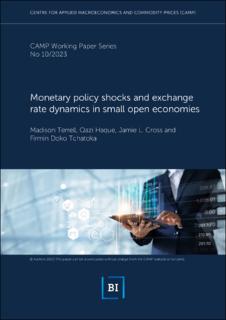| dc.contributor.author | Terrell, Madison | |
| dc.contributor.author | Haque, Qazi | |
| dc.contributor.author | Cross, Jamie L. | |
| dc.contributor.author | Tchatoka, Firmin Doko | |
| dc.date.accessioned | 2023-10-10T16:10:48Z | |
| dc.date.available | 2023-10-10T16:10:48Z | |
| dc.date.issued | 2023-06-29 | |
| dc.identifier.issn | 1892-2198 | |
| dc.identifier.uri | https://hdl.handle.net/11250/3095574 | |
| dc.description.abstract | This paper investigates the relationship between monetary policy shocks and real exchange rates in several small open economies. To that end, we develop a novel identification strategy for time-varying structural vector autoregressions with stochastic volatility. Our approach combines short-run and long-run restrictions to preserve the contemporaneous interaction between the interest rate and the exchange rate. Using this framework, we find that the volatility of monetary policy shocks has substantially decreased in all countries. This leads to a considerable reduction in the significance of policy shocks in explaining exchange rate and macroeconomic fluctuations since the 1990s. However, we find that the dynamic effects of the policy shocks have remained stable over time. Finally, while we do identify violations of uncovered interest parity (UIP) in some countries, we find no evidence of the ‘exchange rate puzzle’ or the ‘delayed overshooting puzzle’ in any country. | en_US |
| dc.language.iso | eng | en_US |
| dc.publisher | BI Norwegian Business School | en_US |
| dc.relation.ispartofseries | CAMP Working Paper Series;10/2023 | |
| dc.subject | Monetary policy shocks | en_US |
| dc.subject | Exchange rate | en_US |
| dc.subject | Dornbusch overshooting | en_US |
| dc.subject | UIP | en_US |
| dc.subject | TVP-VARs | en_US |
| dc.title | Monetary policy shocks and exchange rate dynamics in small open economies | en_US |
| dc.type | Working paper | en_US |
| dc.source.pagenumber | 59 | en_US |
